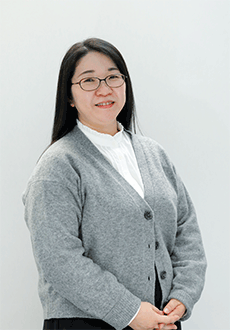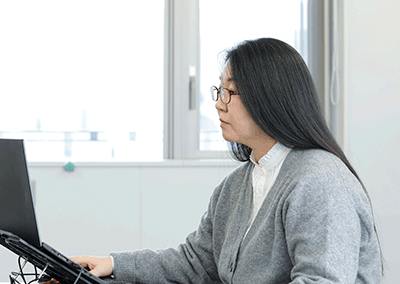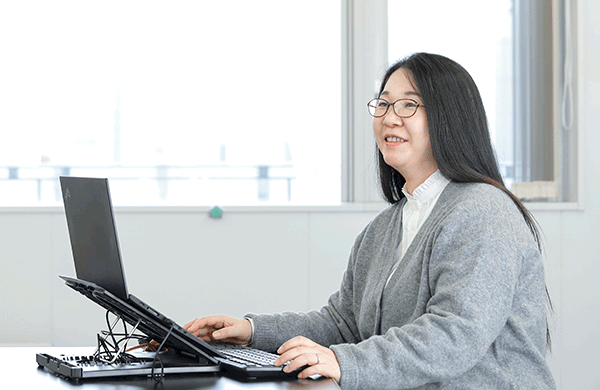My personal life is also fulfilling because I can work at home, and my relationship with my children become more better (Ikuko Yamada, Technical Scientist)

Many women active in a variety of fields work at RIKEN BRC. We interviewed 12 of these women for their insights on how they continue to flourish with work styles that fit their particular lifestyles.
In this interview, we spoke to Ikuko Yamada, who works as a Technical Scientist in the Technology and Development Team for Mouse Phenotype Analysis.
Yamada has an interesting background. Initially, she studied in the psychology and wanted to be a counselor, but she learned about behavioral pharmacology in her practical work at university, and went into the research profession instead. She spoke to us about her thoughts on work, motivation, and hopes for the future, among other topics.
Profile
- Ikuko Yamada
- Technical Scientist, Technology and Development Team for Mouse Phenotype Analysis
- Yamada was employed at RIKEN starting in 2006 as a temporary staff member, and joined as a technical scientist in 2009. Currently, she is primarily in charge of phenotype analysis for genetically altered mice.
I went to university to become a counselor but found the field of behavioral pharmacology and went into the research profession.
Initially, I was more interested in the humanities, and I was really bad at physics and math. I completely altered my path to the sciences because of a hands-on lesson in my third year of university.
I was interested in clinical psychology, so I entered university with the aim of becoming a counselor. I wanted to learn about what lies at the bottom of people’s hearts, but when I actually had the chance to do practical work in counseling, I realized that my personality was just not suited for that work.
When I was trying to figure out what to do next, I came across behavioral pharmacology, which uses scientific methods to approach people’s hearts. Behavioral pharmacology integrates psychology and pharmacology. The methods are different, but the goal is still to get to the bottom of people’s hearts.
In practical work for behavioral pharmacology, I learned that giving medicine to rats makes them smarter, and conversely, they become unable to do things they were previously able to do, which showed that changing the brain changes behavior. After six months of practical work, I became confident that this field suited me, and I chose behavioral pharmacology for my graduation paper topic. I decided to go on to graduate school to deepen my knowledge.
It’s unusual for someone who came from the humanities field to come to RIKEN as a research position, but the experiences and knowledge I built up then help me even now. I have new discoveries and feel fulfilled every day, so I’m really glad that I took a leap and decided to change my goal back then.
The sense of achievement I get from being part of a team makes me like research even more.

The lab that I belong to works on projects through cooperation as a team. At first, I was taken aback because at university, I had done all my research alone, but there is a lot that I can do because I’m part of a team, and many joys that are only possible as a team, so I have come to like research even more.
I was particularly struck by the research in which the gene that causes hyperactivity was identified in a project by a researcher on the same team, and this was published in a paper. In this research, mice were given drugs to change their genes, and then we examined the functions of these genes. We were all involved, with different roles—one staff member discovered abnormalities in the mice’s behavior, I helped analyze this, and a researcher wrote the paper—and as a result, I felt a sense of accomplishment on an entirely new level.
I never forget the words of Takaaki Kajita, winner of the Nobel Prize in Physics: “Research is not something that is immediately useful, but something that expands the horizon of human knowledge.”
I don’t know if I can expand the horizon of human knowledge, but it would be enough if my own research can help someone who is capable of that. I feel like one of my wishes has been granted, and I’m glad that I’ve continued with my research.
My personal life is also fulfilling because I can work from home, and my relationship with my children become more better.
Two years ago, I began working from home because of the pandemic. While working from home, I primarily analyze data from the results of experiments, and also analyze how the behavior of mice changes when there are genetic mutations.
Since RIKEN had a discretionary working system, my working hours have always been flexible. Furthermore, remote work is now possible, allowing me to do household chores in between jobs, which is very helpful to me as a housewife. For example, when my children go to school, I begin work, and at lunch I go shopping, then take my children to cram school and work again. I am able to allocate time to housework, caring for my children, and work at my own pace, so my work has become more efficient, too.
In addition, I feel that my children became kinder once they saw me working. On days when I was tired, I would relax in the bath and recover a little, but while my kids would get frustrated with me before, complaining that I was taking too long, now they tell me to take my time and show appreciation. This makes me happy, and also motivates me to work. I plan to continue working steadily on my research so that I can expand the horizon of human knowledge, while also valuing time with my children and family.
